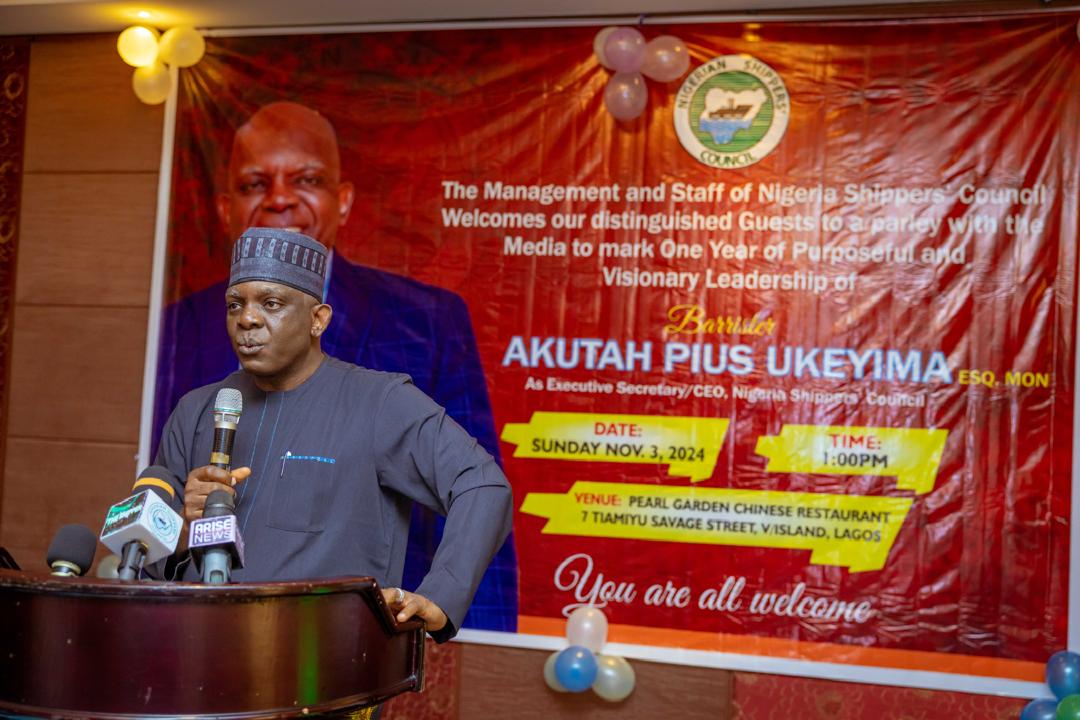The Nigerian Shippers’ Council (NSC) is pressing for the swift passage of the Nigerian Port Economic Regulatory Agency Bill to significantly boost Nigeria’s standing in the African Continental Free Trade Area (AfCFTA) and strengthen its economy.
Speaking at a media briefing in Lagos marking his first year in office, NSC Executive Secretary and CEO, Barr. Pius Ukeyima Akutah, emphasised the urgency of positioning Nigeria to capitalise on AfCFTA’s potential, which opens a $4 trillion market to 1.5 billion people across the continent.
“The AfCFTA presents a transformative opportunity, but we cannot afford to leave our markets open to other nations without a strategy,” Akutah stated.
He highlighted the council’s commitment to building strong alliances with government agencies and stakeholders involved in trade facilitation, noting that a unified approach is critical to securing Nigeria’s economic interests.
A significant part of this strategy, Akutah explained, lies in the advancement of the Nigerian Port Economic Regulatory Agency Bill, recently passed by the House of Representatives and now awaiting Senate concurrence.
Akutah assured that the bill is a cornerstone of President Bola Tinubu’s agenda to rejuvenate the maritime sector, setting the stage for economic growth, job creation, and regional trade alignment.
“This bill represents a forward-looking approach to repositioning our industry in line with global trade standards and regional dynamics,” he said.
He said once enacted, the law will simplify the regulatory landscape, providing Nigerian businesses with a clearer framework for navigating trade rules across Africa and streamlining international business practices.
The legislation also includes provisions to strengthen border controls, giving the NSC the authority to better monitor and record trade activities at Nigeria’s borders, an initiative Akutah says will improve national trade volume data and enable more effective economic planning.
Furthermore, the bill aims to foster greater cooperation between NSC and other agencies, enhancing port productivity and driving up trade volumes through increased efficiency.
Akutah underscored the importance of curbing actions detrimental to trade growth in Nigeria, pointing to specific penalties within the law designed to discourage practices that impede business progress.
He called for urgent improvements in the continent’s maritime logistics, warning that limited connectivity and a lack of intermodal transport infrastructure could jeopardise AfCFTA’s success.
“One of the biggest obstacles to AfCFTA’s implementation is maritime logistics,” he noted. “Without addressing connectivity across Africa, goods will struggle to move efficiently. We must advance rail and intermodal transport systems to facilitate smoother trade across borders.”
On the role of shipping services, Akutah emphasised that port development is meaningless without vessels to support trade. To address this, he said NSC is prioritising partnerships with major global shipping companies, aiming to transform Nigeria into a maritime logistics hub for Africa.
“Our plan is to work with global shipping giants to capitalise on Nigeria’s growing port infrastructure, ensuring that our facilities meet the standards needed to attract more traffic,” he said, adding that several shipping firms have already expressed interest.
Akutah also highlighted investment opportunities in Nigeria’s maritime sector, urging investors to tap into this growth area, which he described as ripe for expansion.
Reflecting on his first year’s achievements, he cited the Council’s success in resolving a trade dispute that nearly led to a $70 million loss, resolved within 48 hours through NSC’s conflict resolution mechanisms.
Akutah pledged continued engagement with stakeholders in the coming year to further enhance trade quality and efficiency.


